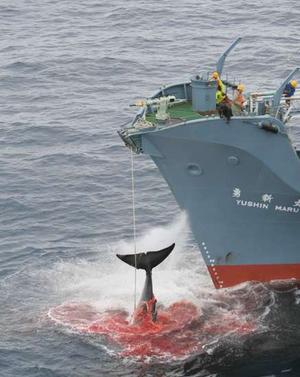
The International Whaling Commission may ease its ban on commercial whaling to allow Japan to hunt whales off its coast in return for killing fewer whales in the Antarctic, officials said Tuesday.Officials and whalers in the only three countries with whaling industries quickly praised what one commissioner saw as a step toward normalized commercial whaling — a sensitive issue for conservation groups, some of which have tried to disrupt Japan's whaling fleet.Paul Watson, captain of the ship operated by the U.S.-based Sea Shepherd Conservation Society, opposed the deal."It's sort of like saying to bank robbers that you can't rob a bank in the city, but we'll let you do it in the country," he told The Associated Press by satellite phone from the Antarctic Ocean.Japan would be allowed to conduct commercial whaling in local waters in exchange for reducing the number of whales it kills in the Antarctic for scientific research — up to 935 minke whales and 50 fin whales this season.The proposal, first reported in The Washington Post on Sunday, did not specify how many whales Japan would be allowed to kill.Under current IWC rules, whales may be killed for research but not for commercial purposes. Opponents say the Japanese research expeditions are a cover for commercial whaling, since the whale meat is sold on the market.The chairman of the IWC, William Hogarth, told the AP that the U.S. feels the ban on commercial whaling should stay in place. But he said the number of killed whales has been increasing, and the plan is an attempt to reduce the kill."There are a heck of a lot of hard, tough decisions to be made," he said. "In the end, it's gotta be better for the whales than it is now."The plan will be distributed to IWC member countries Feb. 2, Hogarth said. The IWC's next annual meeting is in June.Japan has wanted to hunt whales in local waters for years and says its whaling is solely for scientific research. As the world's most active whale hunter, it has been the focus of international protests.Japanese fisheries agency official Hiromi Isa said his country hopes to resolve the deadlock that has existed since the IWC banned commercial whaling in 1986.The other two whaling countries are Norway and Iceland, which chose not to abide by the ban as allowed by IWC rules.Norwegian Whaling Commissioner Karsten Klepsvik said the country welcomes steps to normalize commercial whaling. Norwegians have complained that the IWC is more interested in preventing whale hunts than managing whales."We have not been part of these negotiations," Klepsvik told the AP. "If Japan can come to a compromise, we would not be against it."Kristjan Loftsson, managing director of Icelandic whaling company Hvalur said any agreement on allowing Japan to resume commercial hunting would be welcome."If this is agreed this will be a step forward, because the IWC was set up to manage whaling stocks — not to set down quotas," he said.Any change to the IWC ban on commercial whaling would require the support of 63 countries — 75 percent of the 84 member nations. But any country can object to a change to avoid being bound by it. Australia responded to the plan Tuesday by ruling out ever supporting commercial whaling. New Zealand said it wanted to see the final details of the plan. "I think it's a healthy thing that nations are trying to work creatively to find a way out of the deadlock that exists," New Zealand Foreign Minister Murray McCully said. Tim Stephens, a Sydney University expert in international law as it relates to whales, said both sides stood to win politically from the plan. He said it promises Tokyo a face-saving way to abandon the expensive annual voyage to Antarctic waters and international recognition of commercial whaling in Japanese waters. Stephens is part of an Australian panel of experts that argues that Japan's scientific whaling contravenes international law. To whaling opponents such as Australia, the plan offers a way of securing the Antarctic sanctuary declared by the IWC in 1994 in which whales are truly protected, he said. The whales that Australians see frolicking off their coasts during annual migrations are all from Antarctica. The only losers would be the whales themselves, Stephens said. "If the deal is as suggested, it would certainly be a win for Antarctic whales, but not necessarily a win for whales in general."
No comments:
Post a Comment